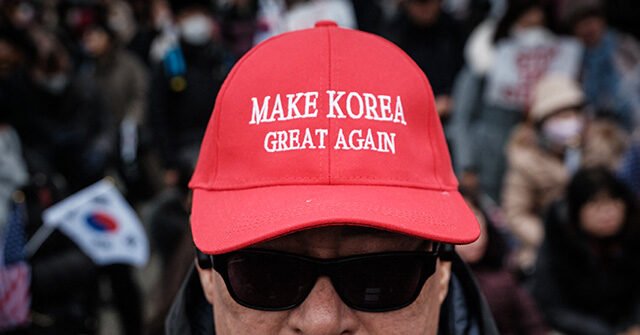In the past month, protests supporting impeached and arrested President Yoon Suk-yeol in South Korea have increasingly featured American flags and a host of other U.S.-inspired iconography, such as “stop the steal” signs, red “MAGA”-style hats, and crowds dancing to the Village People hit “YMCA.”
South Korea is experiencing an unprecedented political crisis that escalated on Wednesday with Yoon’s arrest. Members of the Corruption Investigation Office for High-ranking Officials (CIO), which is handling his case, had attempted to arrest Yoon on Friday, but failed when the Presidential Security Service (PSS) blocked their entry to the presidential residence, asserting that it was a sensitive national security site and barreling in to arrest Yoon could compromise military secrets.
Nearly 9,000 conservatives rallied to support Yoon on Wednesday near the residence, the South Korean newspaper Chosun Ilbo reported, compared to a much smaller crowd of 850 people who gathered to oppose Yoon’s continued position at the helm of the country. The crowd sizes indicate a significant shift in the political tenor of the conservation around the presidential crisis, as the nation appeared to overwhelmingly support impeaching Yoon in early December.
Yoon, who has served as president since 2022, attempted to impose martial law on the country on December 3 in an unexpected nighttime national address. The president, a conservative, said military rule was necessary because the leftist-dominated National Assembly was obstructing his agenda, potentially on orders of communist North Korea and other malign influences.
“I declare martial law to protect the Republic of Korea from the threats of North Korean communist forces,” Yoon said in his speech, “to immediately eradicate the unscrupulous pro-Pyongyang anti-state forces that pillage the freedom and happiness of our people and to protect free constitutional order.”
The martial law decree attracted immediate condemnation and prompted nationwide alarm. It lasted mere hours as National Assembly lawmakers elbowed through throngs of heavily armed soldiers to hold a vote against it. Under martial law, political activity is illegal, so soldiers were deployed to stop the gathering to vote against the martial law. Subsequent investigations suggest the soldiers limited their efforts to stop the lawmakers.
In the initial aftermath of the martial law declaration, Yoon’s People Power Party (PPP) supported impeaching him. Yoon apologized, the military confirmed it would ignore any subsequent calls for martial law from its commander in chief, and the impeachment process began. Over the past month, however, support for the left-wing Democratic Party’s efforts has eroded as it chose to also impeach Yoon’s successor, interim President Han Duck-soo, and Yoon faces criminal charges of insurrection and abuse of power.
Yoon’s legal team has condemned the criminal case against him as illegal and insisted that the warrant issued for his arrest was not actionable. Yoon nonetheless accepted his arrest on Wednesday, stating it was necessary to avoid “bloodshed.” Yoon became the first sitting president in South Korean history to be arrested.
The movement to arrest Yoon has spawned a massive conservative movement in his defense that is, among other demands, calling for American intervention to help stop the Democratic Party. Large American flags are common, and videos of rallies shared online by activists show protesters holding up illustrations of President-elect Donald Trump and signs reading “stop the steal” — a reference, reportedly, to the election that gave the National Assembly majority to the Democrats, which some South Koreans believes to be fraudulent. Yoon himself has fed into these concerns with various comments hinting at North Korean intervention, though South Korean law enforcement and electoral officials have not indicated they have found any evidence of such fraud at press time.
South Korean activists have uploaded videos of rally-goers singing the “Star-Spangled Banner” in defiance of what they believe are anti-American communist forces organizing the impeachment and arrest efforts.
During one rally on January 6, a crowd waving American flags and banners reading “I [heart] USA” was seen dancing to the Village People hit “YMCA,” a fixture of President-elect Trump’s campaign rallies.
On Wednesday, authorities deployed 3,200 police officers to ensure the safe arrest of Yoon in the face of a large crowd in opposition to his detention. The arrest occurred largely peacefully, though some reports indicated mild physical exchanges between protesters and police. At least one man attempted to self-immolate near the office where Yoon was questioned after his arrest, though reports did not confirm if that man was a pro-Yoon protester or happened to be near the office. The man is in serious condition as of Wednesday, according to the South Korean news agency Yonhap.
Yoon has made only one public comment since his arrest — a pre-recorded video statement published after his arrest.
“Seeing warrants being issued by agencies without investigative authority, and courts without the authority to review warrants issuing arrest warrants and search and seizure warrants,” Yoon told his supporters, “and seeing investigative agencies issuing false official documents to deceive the people, committing such illegal acts, and forcibly proceeding with procedures based on invalid warrants, I cannot help but feel regretful.”
He asserted, however, that he would willingly go along with the arrest “to prevent unpleasant bloodshed.”
“As the president who must protect the Constitution and legal system of the Republic of Korea, responding to such illegal and invalid procedures is not an acknowledgment of this [their legality], but rather a desire to prevent unpleasant bloodshed,” he explained.
Yoon was questioned shortly after his arrest and reportedly did not answer any of the questions investigators posed. His attorneys insisted his silence was “not a refusal to cooperate” but a rejection of the CIO’s jurisdiction.
“Since the CIO does not have jurisdiction over insurrection charges, the president is under no obligation to respond. We will instead submit a written statement in due time,” the legal team said in a statement.
